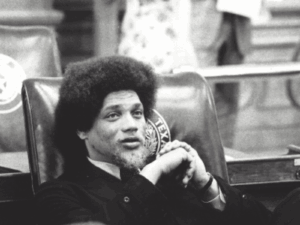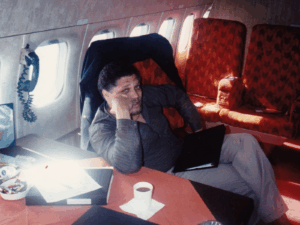Now Reading: Mickey Leland
-
01
Mickey Leland
Mickey Leland

Mickey Leland: A Life of Compassion, Change, and Enduring Legacy
Introduction
George Thomas “Mickey” Leland was a passionate advocate for the poor, a healer by training, and a steadfast civil-rights champion. His life bridged local activism and global humanitarian work. This tribute explores his journey—from pharmacy student to U.S. Congressman—and the deep mark he left behind.
Early Life & Roots in Houston
Born on November 27, 1944, in Lubbock, Texas, Leland and his family settled in Houston’s Fifth Ward at a young age. He graduated from Phyllis Wheatley High School in the top ten percent of his class in 1964niversity of Houston, Wikipedia)
From Pharmacy to Civil Rights Activism
At Texas Southern University, Leland earned a Bachelor of Science in Pharmacy in 1970 University of HoustonWikipedia. He became deeply involved in civil rights activism—leading local campaigns like the “Black Citizens Action Teams” (“Black Cats”) and hosting national civil rights leaders on campus.
Texas Legislature: Healthcare for the Marginalized
In 1972, at just 28, Leland was elected to the Texas House of Representatives, representing Houston’s 88th District He championed healthcare reform for low-income Texans, pushing forward legislation for accessible generic drugs and support for Health Maintenance Organisations (HMOs).
U.S. Congress: Leadership & Hunger Advocacy
Leland transitioned to the U.S. House of Representatives in 1979, filling the seat vacated by Barbara Jordan for Texas’s 18th District. In his first term, he was appointed Freshman Majority Whip, later serving as At-Large Majority Whip, and became known for his leadership in the Congressional Black Caucus (CBC), chairing it in 1985-86.


House Select Committee on Hunger
In 1984, Leland co-authored and successfully established the House Select Committee on Hunger, becoming its chairperson. Though lacking legislative power, the committee focused the nation’s attention on domestic and global malnutrition, raising awareness and shaping policy.
Humanitarian Diplomacy & Global Action
Leland’s compassionate activism crossed borders. He:
- Called on Congress to send $800 million in famine relief to Africa in 1985
- Met with leaders like Pope John Paul II and Fidel Castro to promote humanitarian aid and family reunification.
- Proposed a joint U.S.–Soviet food program for Mozambique during historic post–Cold War talks
He championed programs for fresh food access to women, infants, and children, and supported refugee assistance in the United States and abroad
Tragic End & Global Mourning
On August 7, 1989, while on a humanitarian mission to Ethiopia, Congressman Leland perished in a plane crash near Gambela. Sixteen people, including staff and State Department officials, died in the tragedy. His death triggered global mourning and underscored the unfinished work he had passionately pursued.
Fluent in both English and French, La Salle was respected in both linguistic communities. His tenure helped maintain Conservative relevance in Quebec during turbulent political times.
Remembering Mickey: Namesakes & Memorials
Mickey Leland’s name lives on across institutions and landmarks:
- Houston’s Intercontinental Airport Terminal D
- A federal building in downtown Houston
- Mickey Leland College Preparatory Academy for Young Men in Houston’s Fifth Ward
- A statue in Hermann Park, Houston, unveiled in 2020,
USAID’s Leland Initiative, Energy fellowship, Environmental internship, School of Public Affairs at TSU,
Reflections & Closing Thoughts
Mickey Leland embodied service, combining bold activism with compassionate politics. His commitment to marginalised communities—whether through legislative breakthroughs in Texas, hunger advocacy at the national and global levels, or personal gestures of solidarity—remains an inspiring testament.
On Shradhanjali, we remember him not just as a name, but as a legacy of meaningful action and humanity. His story encourages us to continue the work: building equitable systems, lifting those in need, and honouring lives through service.






